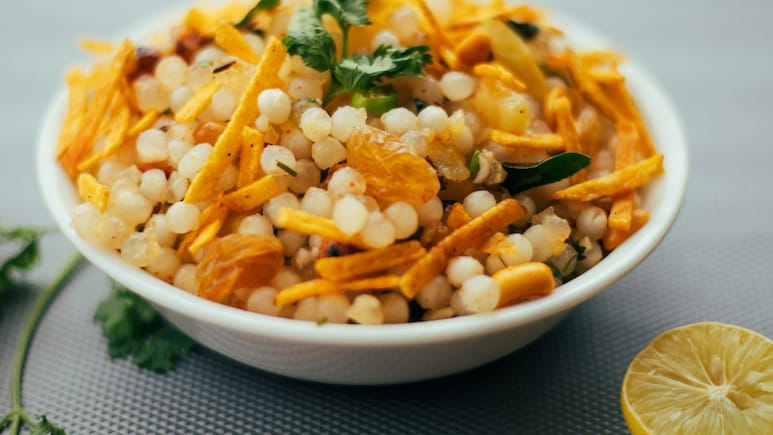
Sabudana, also known as tapioca pearls or sago, is a popular food ingredient used during Navratri. Often considered "falahari," sabudana is one of the common ingredients used to prepare foods for individuals who observe fast during Navratri. While "falahari" means foods derived from fruits, sabudana is made from the starch extracted from the cassava or tapioca root.
Sabudana is made by processing the cassava root to extract the starch, which is then washed, dried, and formed into small pearls. This drying process gives it the characteristic glossy finish seen in the final product. The pearls are small, round, and typically white or translucent before cooking. Since sabudana has no taste on its own, it is often combined with other sattvic ingredients to prepare dishes like sabudana vada, khichdi, or parathas.
Is sabudana healthy?
Sabudana is often hailed as a healthy, weight loss-friendly and highly nutritious superfood. However, if you look closely, it offers some empty calories and can cause sudden blood sugar spikes.
Sabudana is primarily composed of carbohydrates, making it a high-energy food source. However, it is low in protein, vitamins, and minerals.
To better understand the effect of sabudana on your weight, blood suagr and overall health, we spoke to renowned nutritionist Lovneet Batra.
"Sabudana is high in glycemic index and glycemic load, which can contribute to sudden blood sugar spikes. It is also calorie-dense, especially when cooked with potatoes, peanuts, oil, and ghee," Ms Batra said.
Is it a healthy choice for individuals observing a fast?
"Fasting is intended to give your digestive system a break, but sabudana can be more challenging to digest, as it tends to be heavier on the stomach. I personally don't recommend it during fasting."
"However, it can be a suitable option for new mothers or those who are expecting. When combined with yoghurt (dahi), it creates a wholesome meal," the nutritionist added.
For those trying to lose weight
Sabudana is high in calories with low protein and fibre content. The expert recommends that "if you are watching your weight, sabudana may not be the best choice."
For diabetics
Given its high glycemic index, sabudana is not a good option for individuals with diabetes. "Sabudana is not suitable for diabetics. If diabetics still choose to eat it, I suggest combining it with dahi and consuming it in moderation. Options like kuttu roti or samak rice paired with dahi or paneer would be better alternatives during fasting," she added.
Let's also look at some health benefits of sabudana
- Energy source: Sabudana is high in carbohydrates. It provides a quick source of energy, making it ideal for fasting.
- Gluten-free: It is naturally gluten-free, making it a good alternative for those with gluten intolerance.
- Rich in resistant starch: Sabudana contains resistant starch, which may help in digestion and improve your health. Resistant starch reaches the colon undigested and feeds your healthy gut bacteria.
How much to consume
Moderation is key. However, the serving size can vary based on individual dietary needs and activities. It should be consumed in moderation and balanced with other nutrient-dense foods. Combine it with proteins and fibre to create a satiating meal that prevents overeating.
Who should avoid
Individuals with diabetes should exercise caution due to its high glycemic index. Additionally, those trying to limit their carbohydrate intake for reasons such as weight management or metabolic conditions may want to avoid or limit its consumption.
In conclusion, sabudana is not all bad, but it is definitely not a superfood. Its lack of protein and essential nutrients can lead to an imbalanced diet if consumed excessively. It can also spike blood sugar levels and contribute to weight gain if not consumed in moderation.
Sabudana can be healthy when eaten in moderation, but it's essential to be mindful of its nutritional profile and individual dietary needs.
Disclaimer: This content including advice provides generic information only. It is in no way a substitute for a qualified medical opinion. Always consult a specialist or your own doctor for more information. NDTV does not claim responsibility for this information.
Track Latest News Live on NDTV.com and get news updates from India and around the world

